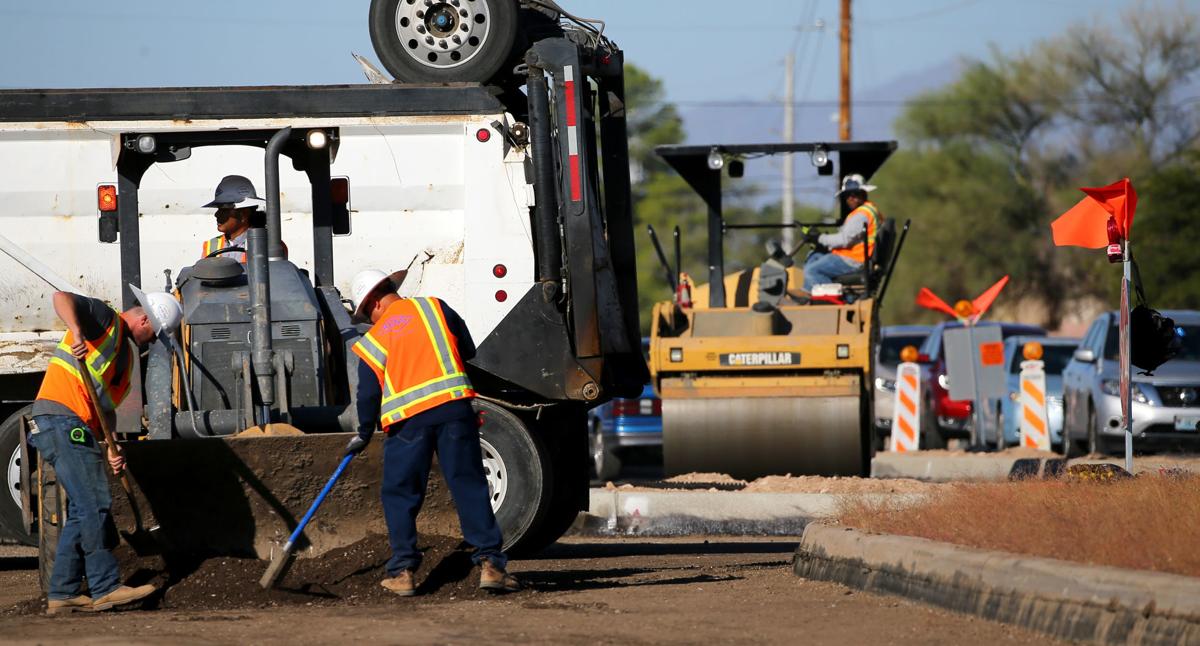The city’s long-term transportation plan, Move Tucson, could already be facing major money problems as many funding sources it would rely on are set to expire soon after its possible implementation.
The proposed 20-year plan is supposed to identify, prioritize and secure funding for Tucson’s transportation needs. A draft of the plan was presented to the City Council last Tuesday, and it included hundreds of projects ranging from street expansion to traffic light upgrades.
The full list of proposed projects is unlikely to be completed within its two-decade timeframe, however. It totals about $13.1 billion, or seven times the city’s entire 2022 budget.
It is intended to reflect the city’s needs rather than realistic project goals.
Officials have suggested smaller increases in spending that would allow the city to address some of its more critical needs, although that approach would still require Tucson to increase its yearly transportation budget by tens-of-millions of dollars.
Even maintaining current funding levels could be a challenge, according to city officials. Move Tucson doesn’t have it’s own built-in funding stream, so the city will have to depend on other sources of funding — some of which will soon dry up — in order to pay for the projects.
“A number of significant transportation funding sources are set to expire over the next seven years including Prop. 101 for street maintenance, RTA sales tax in 2026, Prop. 407 in 2028,” said Patrick Hartley, Tucson’s Complete Streets Program Coordinator. “Even to maintain our current level of investment we’re going to need to look to extend or replace those significant funding sources.”
Expired funding programs can still be renewed depending on how city residents vote at the polls, creating the possibility that those extra dollars will stay available for Move Tucson.
Tucsonans will choose whether to continue Proposition 101 during a special election in May, for example. It was first approved by voters in 2017 for a five-year term, during which the city was authorized to collect a half-cent sales tax that generated millions for road repair.
Proposition 101’s renewal could provide much needed funds for Move Tucson projects. The same could be true for Proposition 407, which has provided millions for projects like bicycle pathways and park improvements.
But a large “question mark” still looms over the future of the Regional Transportation Authority, a 20-year-long initiative dedicated to implementing transportation projects across Pima County, which could also provide one of the largest chunks of funding for Move Tucson.
A future iteration of the program called RTA Next is already being developed. Officials estimate that Tucson could receive $1.4 billion for future projects, but it’s possible the city won’t participate.
Last month, the Tucson City Council unanimously voted to pull out of RTA Next if the city’s long list of complaints aren’t addressed by Feb. 1. The city’s issues include underfunded projects and a voting structure that’s not proportionate to each member jurisdiction’s size.
Some RTA Board members, including Marana Mayor Ed Honea, have already expressed their unwillingness to budge on the proposed changes, making it more likely Tucson will withdraw.
“We should probably plan two tracks. We should plan to do this in conjunction with the RTA and we should also plan some type of contingency for the scenario of doing it by ourselves,” said Councilman Paul Cunningham at last week’s meeting. “We don’t know what the RTA is going to do. They are a big question mark.”
Council members have floated the idea of raising the Proposition 101 sales tax from a half-cent to a full penny when it goes to the polls in May, which could offset what the city will lose if it withdraws from the RTA.
As of now, there is no solid plan to fill a billion-dollar funding gap if Tucson withdraws from RTA Next.
“That Feb. 1 deadline that we put in place for the prior decision on RTA Next, that’s our deadline too. We can’t just withdraw from the RTA if we don’t have our own act together, said Councilman Steve Kozachik. “This is a great framework for 20 years, but we really need more than just these general ideas about Move Tucson.”
Councilmembers voted 6-1 this week to submit a list of necessary Move Tucson projects to the RTA for inclusion in RTA Next, should the city choose to participate early next year.
RTA staff members requested the project list from the city months ago, and asked that it be capped at at $600 million and only include specific roadway projects.
The City Council’s approved RTA list instead contains about $1.4 billion worth of projects to show the city’s overall need. The list includes important Move Tucson elements like funding for road repair, as well as the requested $600 million for specific roadway projects.
The only dissenting vote came from Councilmember Cunningham who felt that Ward 2 was given an “unacceptable” portion of the suggested RTA Next roadway funding. Cunningham said his Ward would receive less than 10% of the $600 million.
“Just remember you guys are all elected city-wide,” a visibly heated Cunningham said to his fellow councilmembers after they approved the motion.
RTA Board members are likely to review the city’s proposed RTA Next project list in the coming months.
City staff are also expected to present alternative funding plans in the near future, which will probably include a “plan B” in case Tucson withdraws from RTA Next.





